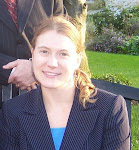FALL ESTATE
PLANNING SPECIAL
Happy Fall! I hope you are enjoying the cooler weather. I am pleased to announce a new addition to my practice and a special offer for the month of October. Amy Perlack, who has interned with me since last summer, has recently graduated from Northeastern University School of Law and has taken the bar exam. She will be working with me as a paralegal (alongside Mary Cretella) until she obtains her bar results and is sworn in as an attorney. Once Amy is sworn into the bar, we hope that she will be able to join my practice as an associate. Amy is very fun, and enjoys fitness and cooking in addition to elder law and estate planning.
Why a Special Offer?
With the new addition of Amy as a
full-time employee, I am making a limited-time offer in order to increase
business. I hope that this offer will
help me train Amy and will increase my work flow to support her over the next
couple of months.
Fall Estate Planning
Special Offer
During the month of October, I am
offering my basic estate planning package at a reduced rate. This offer
requires the client to commit to the plan during the month of October, 2012,
with drafting and signing of the plan to be completed by November 30, 2012.
Basic estate planning documents include Wills, Durable Powers of Attorney,
Health Care Proxies, HIPAA Releases and Advance Directives (otherwise known as
Living Wills).
I am offering the full set of basic documents for a flat fee of $1,500 for a single person and $2,000 for a couple. This offer is hundreds of dollars less than my regular fee ($1,800 for a single person and $2,800 for a couple). Any additional planning or other documents, such as trusts, would be outside this offer’s scope but could be implemented under my standard fee schedule.
I am offering the full set of basic documents for a flat fee of $1,500 for a single person and $2,000 for a couple. This offer is hundreds of dollars less than my regular fee ($1,800 for a single person and $2,800 for a couple). Any additional planning or other documents, such as trusts, would be outside this offer’s scope but could be implemented under my standard fee schedule.
Who Can Take
Advantage of This Offer
The offer applies to any new client. If you have family members or friends who would like to take advantage of this offer, they may do so provided that everyone is okay with my representing both you and your family member or friend.
Estate planning is not just for seniors or the wealthy. At any age, it is important to ensure that you plan for what happens when you are no longer able to manage your own affairs. My practice has grown by supplying this kind of assurance to clients with a full range of needs, from simple estate documents to complex elder law and long-term care and tax planning.
Please Spread the
Word
If you know anyone who could benefit from completing an estate plan at a reduced fee, please let them know about this special offer. This should be a “win-win” for both the new clients and my office. The client will receive an excellent estate plan expeditiously and at a reduced rate, and I will have a temporary increase in basic estate plans to help train Amy and to support her position here.

